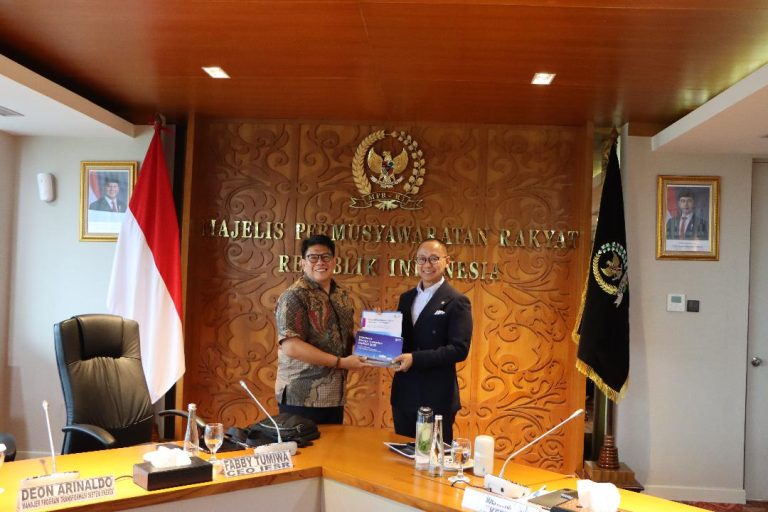Jakarta – The Institute for Essential Services Reform (IESR) said the New and Renewable Energy Bill (EBET Bill) and the Electricity Bill will be key to accelerating Indonesia’s energy transition.
During a meeting with Deputy Speaker of the People’s Consultative Assembly (MPR) Eddy Soeparno at the Nusantara III Building of the House of Representatives/People’s Consultative Assembly on Monday, August 11, IESR urged that both regulations address the challenges of clean energy development, strengthen national energy security, reduce greenhouse gas emissions, and expand access to green electricity for industry and the community.
“This bill must serve as a legal umbrella that promotes Indonesia’s competitiveness in the global market and provides high-quality, affordable electricity,” said IESR CEO Fabby Tumiwa in a written statement.
According to the Ministry of Energy and Mineral Resources, by 2024, the share of renewable energy in the national energy mix will only reach 15.37%. Meanwhile, PLN’s 2025–2034 Electricity Supply Business Plan (RUPTL) sets a target of adding 69.5 GW of power generation, of which 42.6 GW will come from renewable energy. This target requires an investment of up to Rp1,682.4 trillion, with 80% of the funding expected to come from the private sector.
However, IESR warns that investor interest has been low, citing previous RUPTL realisations. The financial feasibility of projects and electricity tariff restrictions that do not reflect cost recovery are considered to be the main obstacles. “Outdated electricity tariffs and procurement mechanisms have resulted in the success rate of renewable energy procurement at PLN remaining below 30% of the plan,” explained Fabby.
The push for clean energy access
IESR also highlighted the trend of renewable energy demand from industries that want to maintain export competitiveness and fulfil sustainability commitments. Fabby mentioned that several neighbouring countries, such as Malaysia and Vietnam, have implemented power wheeling mechanisms or Joint Transmission Network Utilisation (PBJT), so that investors can purchase electricity directly from renewable energy developers.
“The availability of sufficient, accessible, and affordable renewable energy is a prerequisite for investment. The government and the House of Representatives must understand that access to green energy determines our competitiveness,” he said.
IESR Energy System Transformation Program Manager Deon Arinaldo revealed the results of his institution’s study, which shows that Indonesia’s renewable energy potential reaches 333 GW, which is economically feasible, consisting of ground-mounted solar power plants (165.9 GW), onshore wind power plants (167.0 GW), and hydroelectric power plants (0.7 GW). Furthermore, three islands—Bali, Sumbawa, and Timor—are assessed to have the potential to operate entirely on renewable energy by 2050.
During the meeting with Eddy Soeparno, IESR provided several recommendations. For the EBET Bill, the three main points are to include an article on joint use of transmission networks (PBJT), to set PBJT quotas in renewable energy planning, and to enable communities to generate their energy (energy decentralisation).
Meanwhile, for the Electricity Bill, IESR submitted six recommendations, including restructuring the electricity market, establishing a state-owned transmission company or an independent subsidiary of PLN, regulating balancing and supporting services, confirming the profit margin of Public Service Obligation (PSO), establishing an independent supervisory body for renewable energy procurement, and protecting consumers who are prosumers.
IESR emphasises that although accelerating renewable energy requires large investments and private sector involvement, state control over electricity supply for public interests must remain a priority. (Hartatik)
Banner photo: IESR CEO Fabby Tumiwa and Deputy Speaker of the People’s Consultative Assembly Eddy Soeparno. (Source: IESR)















